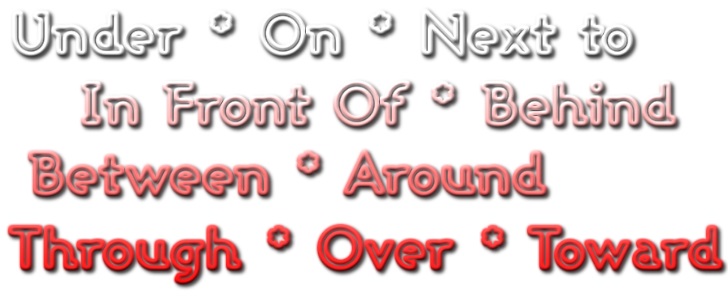 English Prepositions
English Prepositions
A preposition usually comes before a noun or pronoun and dictates its relation to another word, often regarding time or position. There are many prepositions in the English language.
Some common English prepositions are:
above, behind, between, opposite, under, beneath, over, near, past, before, after, at, for, in, until, with, without, toward, through
Example sentences with prepositions:
He lives behind the office.
The bag is in the wardrobe.
What did you do that for?
We opened the door before the cat ran out
Put your shoes under the stairs after taking them off
I finished the puzzle without making a mistake
The Purpose of Prepositions
Prepositions tell us more about what is happening in a sentence.
For example, the sentence: ‘We all went’ feels incomplete. But if we add ‘to the restaurant‘, this tell us where we all went – much more useful! Here, the word ‘to’ introduces the extra information:
We all went (to the restaurant)
More examples where prepositions add extra information:
The horse jumped (over the fence)
She laughed (at the joke)
The boy looked (in the cupboard)
They all hid (under the bed)
Common Prepositions
Here is another list of common English prepositions:
to, for, in, of, at, as, by, on, under, behind, over, off, past, through, up, until, upon, around, with, within, without, before, towards, like, since, save, between, onto, above, regarding, concerning, via, amid, along
There are around 150 prepositions in the English language in total.
Rules about prepositions
Prepositions are always followed by nouns and never followed by verbs. We can, however, follow a preposition with a continuous tense verb, which acts like a noun. (i.e. the verbs ending in ‘ing’).
Also, remember the word ‘to’ is not always a preposition, as it can be part of the infinitive (e.g. to drive, to eat, to remember, to dream, etc.)
For example:
Subject + Verb, Preposition, Noun (or gerund / ‘ing’ verb)
| Subject | Preposition | Noun (or gerund) |
| The dog is | in | the kennel |
| The man sits | on | the chair |
| The tree is | behind | the house |
| He got dressed | after | bathing |
| She is always open | to | new ideas |
Idioms using prepositions
There are many expressions, phrases and idioms that use a preposition. Here are a few examples:
To be caught between a rock and a hard place (meaning: to be in a difficult situation, where both options are equally bad)
Look before you leap (meaning: plan ahead and think of the consequences before you act)
To be over the moon (meaning: to be very happy)
To be behind the times (meaning: to be old fashioned / out-dated)
To be like a fish out of water (meaning: to be out of your comfort zone / to feel out of place / be unsure how to behave in a given situation)
English prepositions quiz
EFL tutors, you can test the knowledge of your students with this fun quiz:
Students can chose the correct preposition from ‘on’, ‘at’ or ‘in’ to complete each sentence (the correct preposition is highlighted here in bold).
There are also a couple of more difficult phrases for more advanced students:
1) My goal is to learn all English prepositions (on, at, in) one week.
2) Does the shop have this jumper (on, at, in) a smaller size?
3) He is meeting his friend (on, at, in) 1 pm tomorrow.
4) They are looking forward to the concert (on, at, in) Saturday.
5) The course starts (on, at, in) the weekend.
6) She works (on, at, in) education
7) She was always (on, at, in) control of the class
8) He spilled the drink (on, at, in) purpose
Should you end a sentence with a preposition?
Sticklers for formal grammar often say that a sentence should never end with a preposition.
For example, these two sentences mean the same thing, but the first one has a ‘dangling’ preposition:
1. Which house did you live in?
2. In which house did you live?
Although the second sentence avoids finishing with a preposition, many people would find it rather formal and stiff.
The first sentence sounds more natural in regular English speech.
This is often the case with prepositions. So it can be preferable to stick with the more natural effect, even if it means a more relaxed approach to grammar.
Share your thoughts on prepositions
Should we avoid ending a sentence with a preposition or doesn’t it matter?
Which prepositions do you find the most difficult to use?
Let us know your thoughts on prepositions in the comments section.

Thanks for sharing this lesson. It helps a lot.
Hi Sidy,
Thanks for your comment. I’m glad you enjoyed our prepositions article and I hope you will find our other grammar pages useful 🙂
Catherine